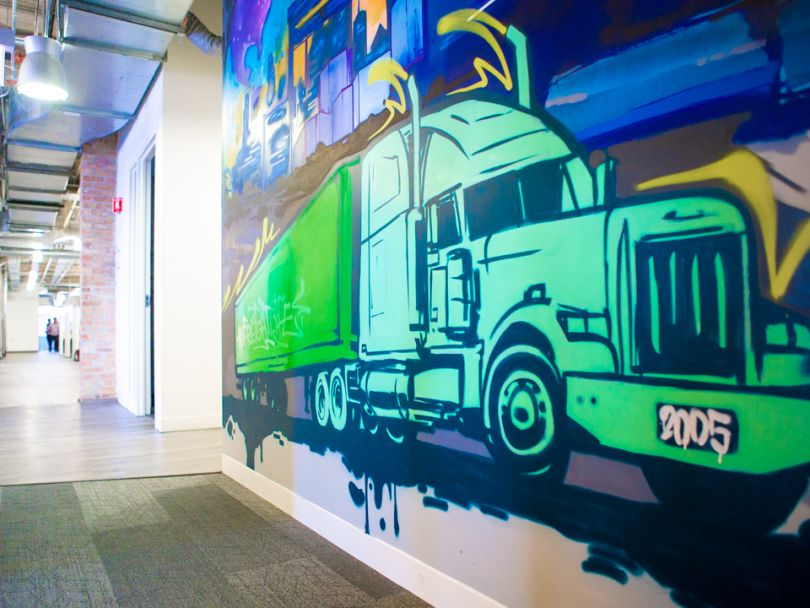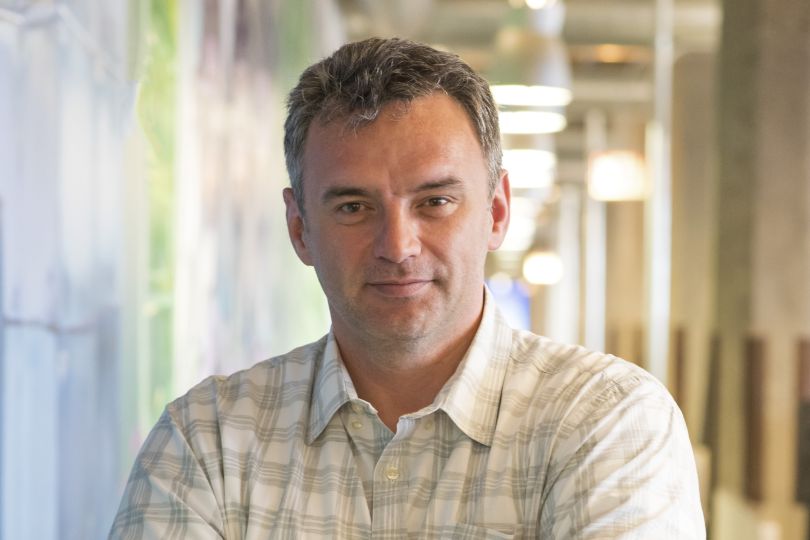For inspiration, Kevin Flaherty need only look out his car window at the semi trucks rumbling past him on the highway.
“Almost every item a U.S. consumer purchases has been in a truck at some point,” said Flaherty, who is director of business analysis at Echo Global Logistics. “Think of how technology can be leveraged to automate and simplify these processes for shippers and carriers.”
That technology is what Flaherty and others are developing at Echo. We spoke to four engineers at Echo to learn how they’re disrupting the supply chain and innovating in the transportation logistics industry.



FOUNDED: 2005
EMPLOYEES: 2,400 national (1,300 local)
WHAT THEY DO: Echo provides a web-based platform for transportation and supply chain management. The platform compiles and analyzes data from its network of over 40,000 transportation providers to help those providers serve their clients’ needs.
WHERE THEY DO IT: Chicago
TECH TUESDAY: Keep an eye on Echo’s social media accounts. Every Tuesday the company will provide an inside look at life on the tech team and the work they're doing. Posts range from team member testimonials to thought leadership Q&As to videos inside the office, all under the hashtag #EchoTechTuesday.


Dave Lundstrom, Senior Vice President of Engineering
As senior vice president of engineering, Dave Lundstrom oversees engineering and ensures his teams are delivering the best technology solutions to Echo and Echo’s customers.
BEYOND WORK: Dave is an avid photographer.
What attracted you to Echo IT?
I’m new to the team. I joined because I was excited about Echo’s potential to disrupt the industry and really innovate. It’s a fascinating, complex industry, so we have some great challenges to solve with technology.
What are the backgrounds of people on the team? Is there a preferred background?
People come from many different educational backgrounds and experiences. Obviously, a CS background is favorable, but it is not required. Bringing perspectives from different industries and technology environments helps us design well-rounded solutions. The key to our success is passion and teamwork.
I try to be transparent and clearly communicate our vision and direction to my teams.”
What is your style of managing?
I try to be transparent and clearly communicate our vision and direction to my teams. Once aligned with a direction, I try to empower our teams to own their solution. I support them by helping remove obstacles and offering guidance.


Jimmy Dyer, Director of IT Organization, Change Management & Communication
Jimmy Dyer manages a team responsible for ensuring employees adopt the new processes that result from technology rollouts. His team pushes people through the change cycle.
BEYOND WORK: He spends a lot of time running on Chicago’s lakefront trails and admiring the backdrop of Lake Michigan.
What attracted you to Echo IT?
I joined Echo IT because working with a team to develop technology within an industry that’s virtually untapped is incredibly exciting. How will the world of transportation and logistics look in the next two, five or 10 years? It’s hard to predict, but working alongside a group of people who are always thinking about that evolution is addicting.
I joined Echo IT because working with a team to develop technology within an industry that’s virtually untapped is incredibly exciting.”
What values does the team hold? Share a brief anecdote of how your team lived out one of these values.
We believe in “BYO—.” And the ending is not what you’d typically think. We fill in that last word ourselves with things like “energy.” The team knows that when they walk into the room, positive energy is infectious. If you want people to buy into your mission, you’ve got to bring it.
Reflect back on when you joined this company. Is there anything about this job that surprised you?
When I joined in 2008, I was excited by the professional growth opportunity associated with a startup. I was serious about my development, and my leaders helped me realize my goals. I started out as an entry-level account executive, and now I oversee change adoption associated with our products companywide. I’m surprised, but not surprised, about the level of investment that Echo made in my future. They believed in me, and it was a great, life-changing decision to stay.


Kevin Flaherty, Director of Business Analysis
Kevin Flaherty oversees business analysts and quality assurance teams responsible for the design and validation of Echo Global Logistics’ technology products.
BEYOND WORK: Kevin enjoys hitting the links, where he can clear his mind and enjoy the few months of good weather in Chicago every year.
If you look at what this team has achieved so far, what makes you most proud?
Our proprietary technology has allowed us to grow into a $2 billion company in less than 15 years. It’s an incredible achievement, but we never settle or become complacent. We recognize the need to continue to innovate and leverage new technologies that allow us to build solutions faster and differentiate ourselves from the competition.
How have your thoughts on transportation logistics industry evolved since joining the team?
The transportation industry is fascinating. Almost every item a U.S. consumer purchases has been in a truck at some point. If you drive on any highway, take a moment to see how many semi trucks are on those roads. Then imagine the processes, systems and manpower used to facilitate these moves. It’s incredibly complicated.
Now, think about how technology can be leveraged to automate, streamline and simplify these processes for shippers and carriers. That is what Echo is doing. We aim to build technology to enable and disrupt the supply chain and help shape the future of our industry.
We aim to build technology to enable and disrupt the supply chain and help shape the future of our industry.”
When interviewing, how do you know you’ve found the right person?
I look for candidates who display flexibility and accountability. Our industry continues to evolve, so our team needs to be flexible as priorities or focus can shift. I always tell candidates that this is not an environment where every day is the same. We want people who will step up and solve problems, not point their fingers or say, “that’s not my job.”
Describe a moment when you overheard your team, and it reflected the culture you intended to make.
I had a moment like that recently. Our office has an open floor plan where teams can communicate and work together, so it’s very easy to observe team interactions. One morning, a team was debating constructively and respectfully on a solution for a problem. Egos and job titles were ignored. It was all about the best way to build a solution. That is exactly the kind of team we want.

Jasmin Cerkic, Director of Data and BI Platforms
Jasmin Cerkic protects and monitors Echo’s database production environment and participates in capacity planning, disaster recovery and technical architecture discussions. Ultimately, he helps the data and DevOps teams better do their jobs.
BEYOND WORK: Jasmin enjoys learning about new technologies and exploring new features, both for their technical aspects and how they can help the business.
If you look at what this team has achieved so far, what makes you proudest?
We became a team. That is what makes me proudest. When I took over the team, we had about five members but no cohesion. Yes, we all sat in the same area, but each and every one of us was in our own silo. Now, we are a true team, and it makes us very happy.
What is Echo Global’s approach to training and mentoring employees?
We’ve always had an official training budget, but up until last year, we were so busy with important “keep the light on” tasks there was no time to learn or develop anything new. It was physically impossible. These days, we are taking a slightly different approach. On items that are crucial to our company success, we are willing to spend the money and allocate time for training on ElasticSearch, Chef (a VM provisioning tool) and more.



What values does the team hold? How has your team lived out one of these values?
We carry the load together. Once, we had to refactor, document and rebuild 400-plus SQL jobs in three months, and we succeeded because we have a divide and conquer approach. We’ve had many challenges, but the team always takes care of them in the simplest possible way — by doing huddles, daily standups and meeting goals.
We carry the load together.”
If a developer came to you and said they were burnt out, what would you do?
I would tell them to go home, take care of themselves and their family, and come back with energy and an idea about what they want to work on. Our mantra is about enabling our people, but sometimes that also means protecting them from themselves.





